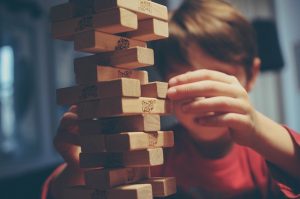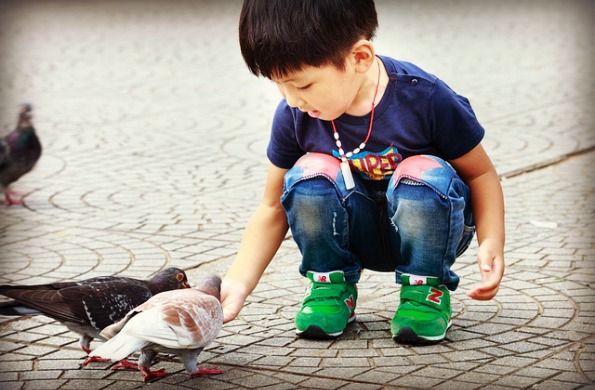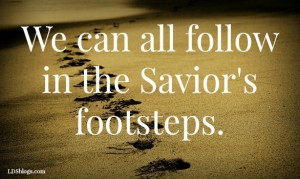I recently read a comment on Facebook from a mom who felt like ABA therapy was torturing her child, so I thought it wise to address what ABA really is. Because for someone new to it or for a parent unfamiliar with what ABA therapy is, it can be confusing.
What is ABA?
 First, I must tell you that ABA stands for Applied Behavioral Analysis. So, in English that means the therapist is wanting to help modify behavior so that an individual can better navigate the world around them.
First, I must tell you that ABA stands for Applied Behavioral Analysis. So, in English that means the therapist is wanting to help modify behavior so that an individual can better navigate the world around them.
Behavior is defined as anything we do. We eat, we breathe, we may even scream — these are all behaviors. So when I mention behavior, know that I am not meaning it in a negative way. But like anything, there is some behavior that serves the individual much better, and ABA therapy seeks to encourage positive behavior, reduce negative behavior, and build life skills.
ABA therapy is a one-on-one therapy that essentially takes a person through many small steps to teach them a better way to handle situations. From a parent’s perspective, ABA has been a godsend. My son used to freeze when a kid he didn’t know said hello. He would ignore the child or run away. But his therapist taught him a script of appropriate conversation, which they practiced a lot. So now when a kid says hello, my son says hello back and even asks if they want to play. He has been given skills he didn’t have in the past.
Teaching Life Skills
 My son also used to struggle with patience. His therapist taught him patience with M&M’s. She would hand him an M&M and ask him if he wanted another one. Of course, he did! They are his favorite candy. Then she said he could have another one if he waited 5 seconds. She had a little timer, and always gave him another one when the time was up.
My son also used to struggle with patience. His therapist taught him patience with M&M’s. She would hand him an M&M and ask him if he wanted another one. Of course, he did! They are his favorite candy. Then she said he could have another one if he waited 5 seconds. She had a little timer, and always gave him another one when the time was up.
It was hard for him to wait that long at first. But she gradually increased the time he waited till he was waiting three minutes between each candy. During the process, she taught him to distract himself with another activity while he was waiting. It’s a skill that has helped him so much! And because of it, our family interactions are much more peaceful.
Natural Consequences
The mom who was complaining on Facebook is likely complaining about the part of ABA where natural consequences are used to discourage undesirable behavior. For example, when kids at play therapy pick their nose, they must wash their hands. A child may HATE washing his hands and complain about it… But it is a natural consequence of putting your hands in a dirty place. So, continuing to have them wash their hands is a great way to teach them not to pick their noses.
 I have also observed my son’s play group learning to take turns. It is hard for my son when it’s not his turn to choose the game, but they repeat the activity often enough that he knows it will be his turn again soon. Being able to predict the order of events helps his anxiety with taking turns.
I have also observed my son’s play group learning to take turns. It is hard for my son when it’s not his turn to choose the game, but they repeat the activity often enough that he knows it will be his turn again soon. Being able to predict the order of events helps his anxiety with taking turns.
It’s a Team
The part of ABA therapy that is still new to me is the way they document every little thing. The only way they can measure progress is by taking a lot of data. My son’s supervising therapist (BCBA) recently forwarded me a graph of his progress for the month. I looked at it and was completely lost. It was a bunch of data points, and the only part that made sense was that the line was going up over time. It was one of the reasons I have decided to become an RBT (Registered Behavior Technician).
That’s the lower rung on the two-step ladder that is the ABA team — and your child always has a team who works with them. I think that is another reason ABA is so effective: you never have one person simply making a guess. The team collaborates and everyone works for the good of the child. As I have been watching the people who work with my son, I really feel like this is a beautiful work. For example, when I was a kid, my teacher threatened us with a paddling if we didn’t do our homework. But in ABA there is NEVER physical punishment.
In ABA, there is simply encouragement and natural consequences. As a parent, I have learned so much watching these team members. Their style of handling conflict and helping children grow in confidence is the other reason I am taking the training. That AND my son still baffles me in so many ways, that I feel I need to understand him better.
So, if you have questions, let me know. I will see what I can do to answer them. And I’ll be sharing some of my new insights as time goes on. There is so much to learn! I’m excited to be taking this next step.
About Abby Christianson
Abby is capable and caring. She is learning more about Autism and parenthood every day. Having completed training to be an RBT (Registered Behavior Technician) for ABA therapy she is beginning to understand her son. And even though she is the first to admit she makes a lot of mistakes, she is so grateful to be on this journey. She comes from a family with many autistic members. She invites us to join her, as she shares her adventures. She wishes to emphasize that Autism is a difference not a defect. If you or a family member have autism, Abby wants you to know that the challenges can be overcome, and there are blessings in autism. You or your loved one are not sick or broken. Together we will teach the world this new language.
Twitter •








This was helpful for me! I am in training to become an RBT right now and I felt a little uneasy about some things and how they related to the restored gospel, but your perspective was nice. 🙂
Thanks for sharing
I’m so glad it helped! Honestly as I get to know more about ABA it seems more like the code of heaven, when done right. And I am so glad I took the training. Good luck in your future!
I am a BCBA and I absolutely love this description of how ABA teaches such meaningful skills. I found this article because of an experience I had several months ago where I began to question my more or less agnostic belief systems …the questioning came after reading a book by one considered to be one of the founding fathers of ABA, BF Skinner. The book is called “Walden Two”. I happened to be in Salt Lake City at the time and visited Temple square (had only just started reading the book) just because it seemed like a pretty place to explore and found myself overcome with an indescribable feeling of peace and belonging. I kept reading Walden, but also began reading about the LDS church beliefs and began to see some parallels… Being no stranger to the science/religion debate I looked and found this while searching if any other Behavior Analysts might have had similar experiences. I somehow feel as though the life experiences that led me to a career in ABA have also led me down this path. I was just getting to the point where I was going to attend a service near me when they put a pause on in person services. Being on near lockdown has only given me more opportunity to investigate more, and for that I am thankful as the more I find, the stronger this feeling grows.
Thank you
I LOVE your experience! I am so glad that you are pursuing this feeling. I have found in my life that feelings like that never lead me astray. The Church has published several resources on a free app that may help in your efforts. It’s called Gospel Library (It’s a black background with a white trumpet playing Moroni on it). The app and has all the scriptures, church magazines, videos, general conference talks, and even the Come Follow Me weekly lessons. Those lessons are what we would be discussing in church if we were having it. Please feel free to reach out with any questions. I’m so excited for you on your journey.
Yep, I’ve downloaded the app and have been listening to the Book of Mormon in my car driving to and from therapy sessions, and when I grab lunch at home I watch the videos. Most striking so far was the woman who joined the circus and went through some dark times and while driving saw a Temple on one side of the road and a Prison in the other. Getting goosebumps just typing about it!